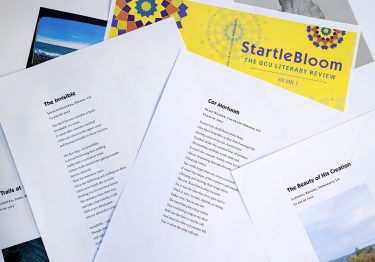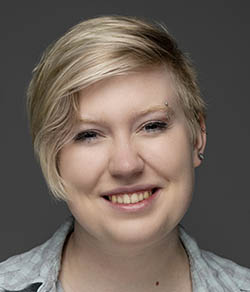
Story by Mike Kilen
Photos by Ralph Freso
GCU News Bureau
Writing became the lyrics of Paige Walker’s life, one of struggle and loss, yet marching forward with rhythm.
The band that plays deep within/That everlasting song in my chest
It’s from her poem, “Cor Mortuum,” Latin for a dead heart, in the new issue of StartleBloom: The Grand Canyon University Literary Review. The annual print edition of student writing and art will be unveiled Wednesday at the College of Humanities and Social Sciences Senior Showcase, which features student projects from all departments.
“I was never good at writing. I was diagnosed with dyslexia starting in third grade,” said Walker, StartleBloom’s co-editor-in-chief. “I know what is going on inside my head, but writing it out on paper it comes out bland.”

In seventh grade, she said, a teacher told her that her poem was awful and that she should leave writing behind.
“I can do better than this," she remembers telling her teacher. "I will show you.”
“I started a full-length book, gave it to her and she said, ‘Wow, this is awful.’ So, I started writing out all my anger on the page, and I gave it to her again. She thought I had stolen it. ‘It’s not you.’
“Oh, it’s all me.”
“That’s when I start realizing it’s not the prompts you write from, it’s the feeling you get from the prompt. That’s when I started writing and never left it behind.”
She used it to process what happened at her Colorado Springs, Colorado, K-12 charter school.
“My friend was in all the high school sports and he was good. His whole image was built around being that person. But people said some things they shouldn’t – that he was going to peak in high school and that’s all he would ever be. By senior year, he didn’t know what life was going to be like after high school and decided that was it, that was all he was going to do. My friend committed suicide because of social media.”
She sought escape and came to GCU, found Christ and a student writing group called Write On. Both helped her find herself and find hope. “I was able to sort through all my thoughts.”
Dr. Diane Goodman, Professor of English, helped her fight the writer’s block from dyslexia that left her staring at a blank page for hours. She told Walker to say it aloud, record it and then put it to paper.
The words came fast and furious, emotions and memories that lifted her spirit in high school, including marching band that wasn’t all drum vibrations and trumpet crescendos.
No, it was the idea that every part had to/Work in sync. In time, rhythm, or rhyme
She used her writing experience to bring the instruments of others together with co-editor-and-chief Lizzy Esparza and a board of four other writers who selected 33 works of literature and art from among more than 200 StartleBloom submissions.

“We went through the idea of core emotions. What does the writer feel and what can the reader pull from it?” Walker said. “We looked for poems that hit the heart of the reader or the author.”
Most of the work is poetry, but there is some short fiction in the seventh edition of the annual review, launched by Goodman to give students the experience of working on a literary journal.
“They write about family and romance, and a lot of them are writing science fiction or fantasy. But the material we pick is not superficial,” Goodman said. “If they are writing about something personal, a lost family member or breakup, they know about literary devices – images, metaphor, narrative, simile – to make it a more universal experience once it transforms into a poem or story.”
The writing comes from a deep place, such as “The Invisible” by Jocelyn Sanders.
Invisibility – my inevitable curse./Though they claim to see you –/and call you spotted and pink,/an elephant on parade,/until you want to scream:/”I am Me! I am Me!”
“I started to feel like I didn’t exist as a human being. I was in this gossip magazine to be read and thrown away,” Sanders said of her place as a woman in culture and her time growing up in Fresno, California. “Through it all, I became invisible to the people around me. They couldn’t see what I’d been through and they couldn’t connect with me. So I started writing to ask, ‘How did I get to this point?’”
Writing became a companion to work through it, and after she came to GCU and Goodman recommended writers such as T.S. Eliot and Edith Wharton, her fire for it flared.

Sanders joined the StartleBloom board, and she saw in numerous submissions with sad themes, the result of a generation “overworked and having problems,” Sanders said. Yet, societal downturns and the fallout of technological change have historically created a renaissance of art and writing to work through it.
She wears pink, heart-shaped sunglasses, writes at 2 a.m., reads Kafka and tries to make sense of it all, whether monster or man, horror or hope.
“What it comes down to is everyone feels hurt at some point in their life. Every hurt is unique and every scar is unique. But it’s invisible, and they feel invisible with it,” she said.
“I like to make people talk about things they don’t want to talk about.”
For Walker, it means that readers don’t all leave with the same reaction, or even meaning, from her product.
“If I write something and they got something out of it, it’s a success. It can be happy or sad,” she said.
Her own story has a surprise twist.
“I wanted to escape where I came from. I hated that school,” she said of her charter school. “It was the building, it was me – I never thought I was good enough.
“So I want to reach out to those kids who don’t think they are good enough and show them. I have dyslexia. I cannot spell to save my life. I fumble over my words. I can’t do math. But I made it. I am teaching you.”
Walker accepted a position to teach third grade at her old school and starts in August.
Grand Canyon University senior writer Mike Kilen can be reached at [email protected] or at 602-639-6764.
****
CHSS Senior Showcase: 9 a.m.-noon, Wednesday, April 20, CHSS Building. Connect with graduating seniors and see their research projects from psychology, behavioral health sciences, professional writing, communications, social work/sociology, justice studies and Spanish majors.
****
Related stories:
GCU Today: GCU's creative writers don't take summers off
GCU Today: Student literary prowess blossoms in StartleBloom



































































